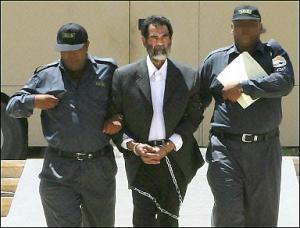Saddam's Fate and American Reaction: What Will It Say About Us?

It is wrong to take pleasure in the approaching death of any human being, and therefore we do not celebrate the fact that – barring an exceedingly unlikely turn of events – Saddam Hussein will soon be dangling from a hangman's rope. But we recognise the justice of yesterday's death sentence by the court in Baghdad, and we also welcome the fact that this guilty defendant will be denied the firing squad reserved for those to whom a shred of honour still attaches.The whole thing is worth a read.
In the same newspaper, Janet Daley offers some thoughts about where public opinion on Iraq-- both in Great Britain and American-- will go as Saddam trudges towards the gallows:
So perhaps we could just take the next chapter as read. Those who have always supported the removal of Saddam will see this verdict as a vindication: condemnation of his crimes by his own compatriots and an appropriate judicial end to a homicidal tyranny. The various strands of opposition to his removal – anti-war in general, anti-this-war in particular, anti-American, anti-Israel, not to mention the cynical we-can-do-business-with-this-guy mentality of the Europeans – will use it, and its consequences, as more evidence for their case that we should have left Iraq alone.Read the entire piece.But while we all worry about whether Iraqi democracy is salvageable, it might be worth asking precisely what is happening to our own idea of "government of the people, by the people, and for the people" as it is refracted through this foreign crisis. I was in the US last week when John Kerry's remarks about the intellectual calibre of American military personnel hit the fan. The TV news channels played and re-played his description of the US forces in Iraq as an army of thicko no-hopers. The fact that he uttered it so smugly and unselfconsciously added to the stupendous effect. He had simply forgotten himself and spoken as he would among friends. He had no sense that this was an offensive thing to say: in the circles in which he travels, it is the conventional wisdom.
That insouciance was a gift to the Republicans. What the Kerry gaffe did was to make clear the gap that now exists in American politics between the great mass of American popular opinion – for whom soldiers, especially when they are risking their lives in battle, are heroic figures – and the liberal elite for whom military action is a dirty, downmarket game. So when exactly did snobbery become the province of the Left? . . . .





0 Comments:
Post a Comment
<< Home